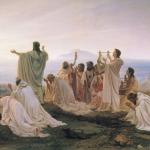 Here’s my list of best books of 2013. I am sure I forgot a few, but these were the ones that quickly came to mind.
Here’s my list of best books of 2013. I am sure I forgot a few, but these were the ones that quickly came to mind.
Best Overall Academic Work
I am confident that this award should go to William Baird’s outstanding History of New Testament Research Vol 3 – organized sensibly, anecdotally satisfying, insightful, fair. I was surprised to find it so enjoyable to read.
Best Commentary
This prize belongs to Scot McKnight’s excellent Sermon on the Mount commentary that kicks off the Story of God series by Zondervan. Scot has read so widely and is able to really think through the kinds of questions everyday people think about. In fact, at the moment one of my colleagues is borrowing this book from my personal library.
Best Reference Work
I am going to cheat and call this a tie between the second edition of the Dictionary of Jesus & The Gospels and also Old Testament Pseudepigrapha: More Noncanonical Scriptures. Both of these are essential items for any serious library. I have spent a good bit of time already in DJG2 with much benefit. I think, based on the success of DJG2 already, we can expect IVP to consider working on new editions of the other volumes. If not, they should be!
Best Introductory Book
Again, I have to call a tie between Don Hagner’s The New Testament: A Historical and Theological Introduction and Gene Boring’s An Introduction to the New Testament. The former is more advanced and reads more like a series of essays. The latter is more of a true “textbook” and loaded with insight on a broad scale. Both of them, in different ways, are equally valuable. I consult both quite often. Both of them are very interested in the question of the relationship between history and theology – a key hermeneutical and philosophical question for a new era of students.
Best Book on Paul
I would say Brian Rosner’s Paul and the Law is the best contender – while Brian is too modest to call this a major contribution to the subject, I feel persuaded by his overall argument and I found it very helpful when approaching perspectives old and new on Paul and the Old Testament law. Also, I look forward to using it as a textbook in my Galatians course in the spring.
Best Book on the Gospels
I am thinking of Francis Watson’s Gospel Writing. Truth be told, I read a lot of it, but did not understand some of the more advanced discussions. However, I think this will stand as a major attack on the necessity or even plausibility of “Q.” Watson sees a better way forward, especially when looking at Luke and Matthew in closer relationship (Luke with access to Matthew). I am hoping to conduct an interview with Prof Watson to ask some probing questions about his work. Stay tuned.
Best Old Testament Book
Right now I am really enjoying Walter Moberly’s Old Testament Theology. It is not a comprehensive, “systematic” theology of the Old Testament, but, rather, a series of theological explorations. What an outstanding thinker and writer – eloquent, cogent, even poetic. I will have more to say in due time when I have read another few chapters. Currently I am enjoying his reflections on the question, “Does God change?”
Best Multi-View Work
There have been several multi-view books out this year (e.g., inerrancy, historical Adam), but pride of place must go to Four Views on the Role of Works at Final Judgment. I found the conversations between Barber, Dunn, and Schreiner especially rewarding. This would make a very nice companion textbook to any New Testament theology course.
Best Work over 1600 Pages
So many good options in this category, but I suppose it should go to N.T. Wright’s Paul and the Faithfulness of God. Seriously, though, it is such an important work that caps a lifetime of serious study by a leading Pauline scholar. I am only about 20% through the tome, but I have enjoyed several mini-discussions. It is more of an encyclopedia than a monograph, but well thought-out and incisive in critique of what’s already out there. I will have a serious review coming next year with Interpretation.
Best Systematic Theology Introduction Written by a Red-Headed Australian Reformed New Testament Scholar
As luck would have it, a perfect choice presented itself this year – Mike Bird’s Evangelical Theology! Apparently it has been very well received and some are pitching it as a healthy alternative to Grudem (I am all for that!). Love to see the theology-Biblical Studies cross-pollination. Also, never hurts to have a touch of humor. Way to go, Mike. Get some sleep now, bro. I am expecting a great Romans commentary out of you next year…











